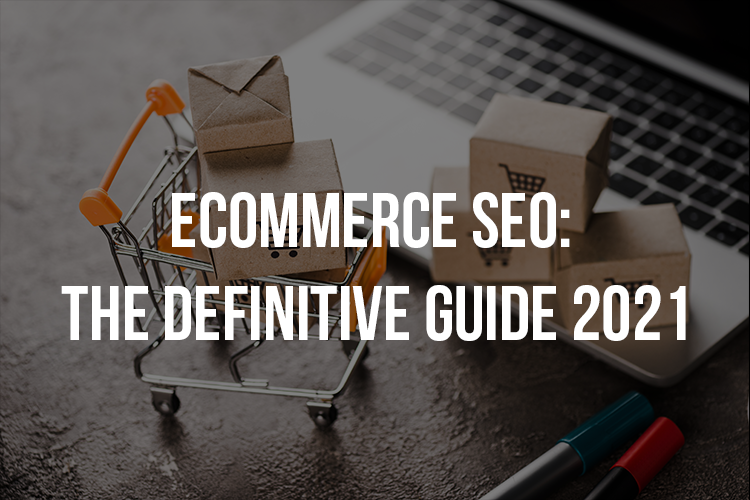A good SEO strategy is essential for eCommerce businesses to succeed in 2021 and the coming years. To actively promote sales, your website has to be visible to search engines, especially Google. Once you get the visitors you have to engage them, provide useful information, and entice them to purchase. SEO helps you in all these areas through increased website traffic and high conversion rates. In this article, we will discuss how to implement eCommerce SEO strategies to rank your website higher and increase sales or conversions.
Ecommerce SEO in Detail
Ecommerce SEO in simple words means the ways to optimize your website so that it ranks higher in search engine results for your product niche. 70% of consumers start their product shopping journey by entering the details in search engines. A top-of-the-search page or high ranking ensures greater visibility for your site and puts you ahead of the competitors.
Nearly 40% of the traffic that eCommerce sites receive comes from organic search. Excellent eCommerce website SEO raises organic traffic and high conversion rates at the minimum of cost. It optimizes the web pages to provide the best solutions to visitors and potential customers. A highly optimized site will rank higher on SERPs. Optimization includes answers and solutions that are of interest to the customer. If you are useful to the customers, they will prefer your site over your competitors.
Ecommerce Website SEO Tips
Here are some of the tips you can use to improve the SEO of your website.
- Competitor Analysis
Do a competitor analysis for your e-commerce SEO audit. You should know about your competitors in the online market and about the popular eCommerce sites that are dealing in your niche, be it products or services. For example, Amazon and eBay are the world leaders in the online retail space, while Flipkart and Snapdeal are not far behind in the domestic market. With competitor analysis, you will know what SEO techniques and strategies they use to get ahead. You can apply these techniques suited to your website to achieve successful results.
- Easy Website Structure and Navigation
The best eCommerce SEO technique is the ease of navigation for the customer. This should be taken care of at the time of building the site itself. Create a search engine and user-friendly platform to get high SERP ranks and conversions in the future. Do not go for 4 or more levels of page nesting. It makes it difficult for google crawlers to index these pages. Your site structure should be clear and uncomplicated. This allows your site to appear in search engines results right away. An unwritten eCommerce rule is that a visitor should be able to reach the checkout counter within 3 clicks to your website. More than that will increase the chances of failure and bounce rate. Ensure that the shopping cart, product catalogs, Wishlist, and subscription pages are easily accessible to the user. Interlink the pages to make navigation more convenient.
- Get Security Certificate
Use HTTPS instead of HTTP protocol. HTTPS protocol ensures data security and positively affects website ranking. Visitors can safely visit your website and make purchases with their cards as they know their information will not be stolen and misused. Search engines also use it as a ranking factor.
- Mobile Optimized Site
A great eCommerce SEO tip is to optimize your website for mobile phones and tablets. Users increasingly prefer accessing content and making purchases on their mobile devices. Good internet connectivity with low data rates and availability of cheap yet good quality smartphones has made all this possible especially in our and other South Asian countries. Mobile traffic dominates with nearly 50% of total traffic and is surpassing internet traffic generated by computers. Mobile-friendly websites and app versions of your site make for higher conversions and increased profitability.
- Checkout Optimization
The checkout process should be as simple as possible. No more than 3 clicks should be required to reach the checkout cart from any page of your website. Do not be intrusive and ask for irrelevant information. The only information you need is for placing and transporting the order. It enriches the user experience and leads to higher conversions and sales.
- Reviews and Reputation
An essential ingredient of an eCommerce SEO checklist is managing the reputation of your website and posting positive reviews. Consumers on average evaluate 7 reviews before finalizing a product. 85% of consumers only make the buying decision after checking online recommendations or an acquaintance’s advice who has already used the product. Ask you’re satisfied customers to post positive reviews on the site. Also, collect the reviews from review sites like Yelp! and mouthshut.com and publish them on your website.
Our tailored customer-centric approach in marketing maximizes sales.

Our tailored customer-centric approach in marketing maximizes sales.
Search Engine Marketing:Drive traffic, boost conversions & grow your business
Social Media Marketing:Maximize your social media potential & engage with your audience
LinkedIn Marketing:Unlock the power of LinkedIn!
Video Production & Photography:Elevate your business with captivating visuals
Ecommerce SEO Guide– Research for Keywords
Keyword research and application are an integral part of an effective SEO strategy. Keywords help search engines understand the product category of a webpage and thus rank it accordingly. But be careful as incorrect keywords or their misuse may lower the rankings and thus reduce visibility and sales. Keyword research means finding information keys that visitors use to search for relevant content or for finding products and services. Ecommerce website SEO checklist uses commercial keywords that are related to the products or services you offer on your website.
Have a look at some of the effective and popular tools for researching keywords of eCommerce businesses.
- Google Keyword Planner
Google Keyword Planner is an excellent tool to determine the competitiveness of keywords related to your product niche and its viability. When searching for keywords such as “SEO guide,” you can find valuable data at the top of the page, including the amount spent by advertisers for pay-per-click ads. Utilizing Google Suggest can help you find additional long-tail keywords related to “SEO guide.” By entering the keyword into the search bar, you can use autocomplete to check the most popular search results. Additionally, you can find more keywords related to “SEO guide” at the end of the search pages.
- Amazon Suggest
To succeed at something like optimizing your website for search engines, it’s important to learn from the master. Amazon is the master of the online retail space, but you can also use it as a resource for finding keywords related to your “SEO guide” search query. Simply enter your query or product type in the Amazon search bar, and you will get a variety of keywords related to “SEO guide” that can help you improve your website’s search engine optimization.
- Wikipedia
You can also use Wikipedia for eCommerce SEO purposes by finding a variety of keywords for your product niche. Wikipedia is an endless resource for finding keywords. Enter your query in the search bar. Scroll through the search page and view the end of the page to find the appropriate keywords for your products.
- SEMRush
SEMRush provides the added advantage of finding the keywords used by your competitors or market leaders. You have to enter the competitor’s website URL in the search field and then tap organic search. It will throw out all the keywords used by the competitors. You can also use it to find other websites competing in your niche. You can also use SEMRush to analyze your keywords and find out the level of competition for a particular keyword by generating its search volume.
Ecommerce Product Page SEO-How to Pick the Right Keywords
The keyword should match the products of your eCommerce business. Do not use a high-frequency keyword that does not match with the products you sell. Using such keywords will not get you the target audience but frustrated visitors that may post negative reviews. Provide clear descriptions of the products that include the product category, model name or number, brand, the functional purpose of the product, and key characteristics. The web crawlers understand this clear-cut identification and raise your search rankings for keywords mentioning all these details.
Ecommerce SEO Tips– Ways to Optimize Webpages with Keywords
Use the below-mentioned tips to optimize your web pages with the right keywords.
- Optimize the Title Tag
Page titles that include relevant ecommerce SEO keywords are responsible for a huge number of clicks. They inform the search engines and users about the page or content. The page title should have the main ecommerce SEO keyword and be within 60 characters in length. Page titles with question-based headlines that include ecommerce SEO keywords get more clicks than other pages. You can also use modifiers like “best ecommerce seo keywords”, “cheap ecommerce seo keywords”, “updated ecommerce seo keywords”, “new ecommerce seo keywords” in the page title to create long-tail ecommerce SEO keywords.
2. Optimize Meta Descriptions
As part of your seo strategy for ecommerce sites, it’s important to optimize meta descriptions so that web crawlers can identify them. Meta descriptions should provide useful and additional information about the page in line with your seo strategy for ecommerce sites. Ensure that they do not exceed 150 characters to align with your seo strategy for ecommerce sites. Show the benefits or advantages of your product in the meta description as part of your seo strategy for ecommerce sites. Inform the users about the deals and perks like free shipping as part of your seo strategy for ecommerce sites. Pages with meta descriptions get more clicks than other pages, making them an important part of your seo strategy for ecommerce sites.
3. Optimize Webpage Content
Optimizing and creating quality content is a good eCommerce SEO strategy. It helps the search engines to understand and assess your pages. Optimum content per product page should be unique, not plagiarized and 500 words or more in length. Describe and compare your products with similar items. Write about the advantages and benefits of your products. Use the keywords in the text. Keywords placed at the top of the page, in the first 100 words will get your site a higher ranking.
4. Optimize Images
As part of your ecommerce SEO strategy, it’s important to optimize images so they do not slow the load speed of your web pages. Compress them to 1-2 MB as part of your ecommerce SEO strategy. Use the target keyword in the file name to align with your ecommerce SEO strategy. Add keywords in the alternative text in the images as part of your ecommerce SEO strategy. This way search engines will identify and connect the images with the product, which is an important part of your ecommerce SEO strategy.
5. Optimize the URLs
Optimize the URLs for a higher SERP ranking. Add keyword to the URL if possible. It will increase the CTR rate. Choose a short URL and avoid using numbers in page addresses as they make reading difficult. Optimized URLs are easy for both users and search engines to identify.
6. Use Rich Snippets
Rich snippets or Rich results provide additional data like prices, ratings, delivery times, photos, videos, and reviews. This information is very useful and increases organic CTR by 30%.
Ecommerce SEO Checklist– Technical SEO
Technical issues may be the reason your website is getting lower SERP rankings for your seo strategy for ecommerce sites. Technical SEO for e-commerce will help improve your website’s rankings in line with your seo strategy for ecommerce sites. There are several efficient tools available for a technical audit of your website and for the required corrections to implement your seo strategy for ecommerce sites. Some of the noteworthy tools for implementing your seo strategy for ecommerce sites are listed below:
- DeepCrawl
- SEMrush
- SiteCondor
- ScreamingFrog
Ecommerce SEO Guide– Types of Technical Issues
Types of technical SEO issues that a website generally has are as below.
- Duplicate Content
This issue is faced by eCommerce behemoths as they have thousands of products that may have duplicate content and are difficult to keep track of. For each product variation the website will create a different URL and thus similar content is repeated for each product variation page. The search engine will identify this content to be duplicate content. All these pages cannot be easily updated with new content as it runs into thousands of pages. The best solution, in this case, is to create an up-to-date content map listing the location of duplicate content. Use canonical tags to inform the search engine about the location of the main page of duplicate content. Use “noindex” for the pages that do not bring any traffic.
2. Deep Pages
Your website should not have pages that are more than 3 clicks away from the main webpage. These are known as deep pages and lower your SERP rankings and also degrade your browsing statistics. Use the site audit feature of any good technical SEO tool for identifying deep pages and transferring them nearer to the main web page.
3. Page Loading Speed
A high page loading speed is essential to eCommerce product page SEO, which includes the use of relevant ecommerce SEO keywords. Slow loading speeds lower the ranking in the search results for ecommerce SEO keywords. Identify the issues through site performance or site audit feature of the technical SEO tool you are using for ecommerce SEO keywords. Then work on the solutions offered, which will improve the loading speed of the website for ecommerce SEO keywords.
4. Keyword Cannibalization
Keyword cannibalization occurs when the same keyword is used for several posts or product pages. This causes the search engine ratings to drop or the ranking of wrong or non-landing pages will occur. To solve this issue, identify the strongest or highest performing pages on the site and use these keywords only on them. Delete the other pages or use 301 redirects to their URL. Alternatively, you can also use the rel = noindex tag.
5. Thin Content
Keyword cannibalization can be a major issue for ecommerce website SEO when the same keyword is used for several posts or product pages. This can cause a drop in search engine rankings or lead to the wrong or non-landing pages being ranked. To improve ecommerce website SEO and address this issue, it’s important to identify the strongest or highest performing pages on the site and use the keyword “ecommerce website seo” only on those pages. Other pages that use the same keyword should either be deleted or redirected using a 301 redirect to their URL. Another option is to use the rel = noindex tag to prevent these pages from being indexed by search engines.
Ecommerce SEO Strategies– For Link Building
Getting quality backlinks from authority sites is a vital part of eCommerce SEO. You can use different strategies to build quality backlinks to your site. You can contact bloggers and other influencers operating in your niche product market to write guest posts on their platforms. You can get quality backlinks from your suppliers and resellers. You can also join social media groups related to your product niche and contact group administrators. You can also search businesses and websites operating in your domain that have shut shop. Contact the site owners and offer a replacement in the form of your own URL. In these ways, you can build quite a bank of backlinks to your eCommerce business.
Conclusion
So, this is our definitive guide to Ecommerce SEO for 2021 and beyond. Use the tips presented here to improve your organic search ranking, increase traffic and get higher sales.



